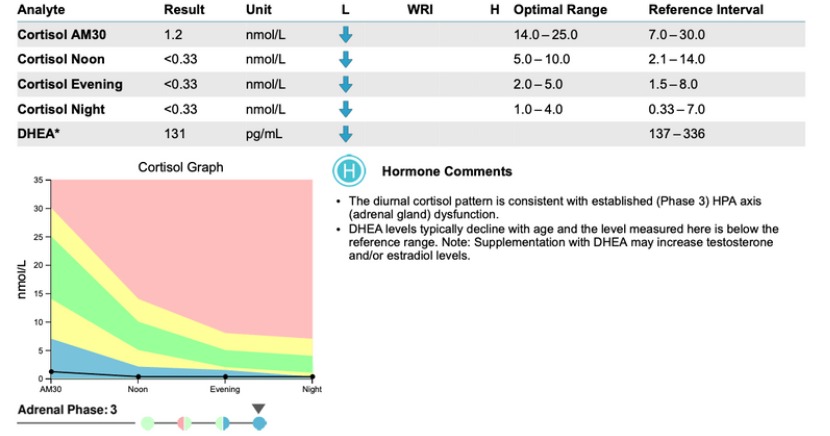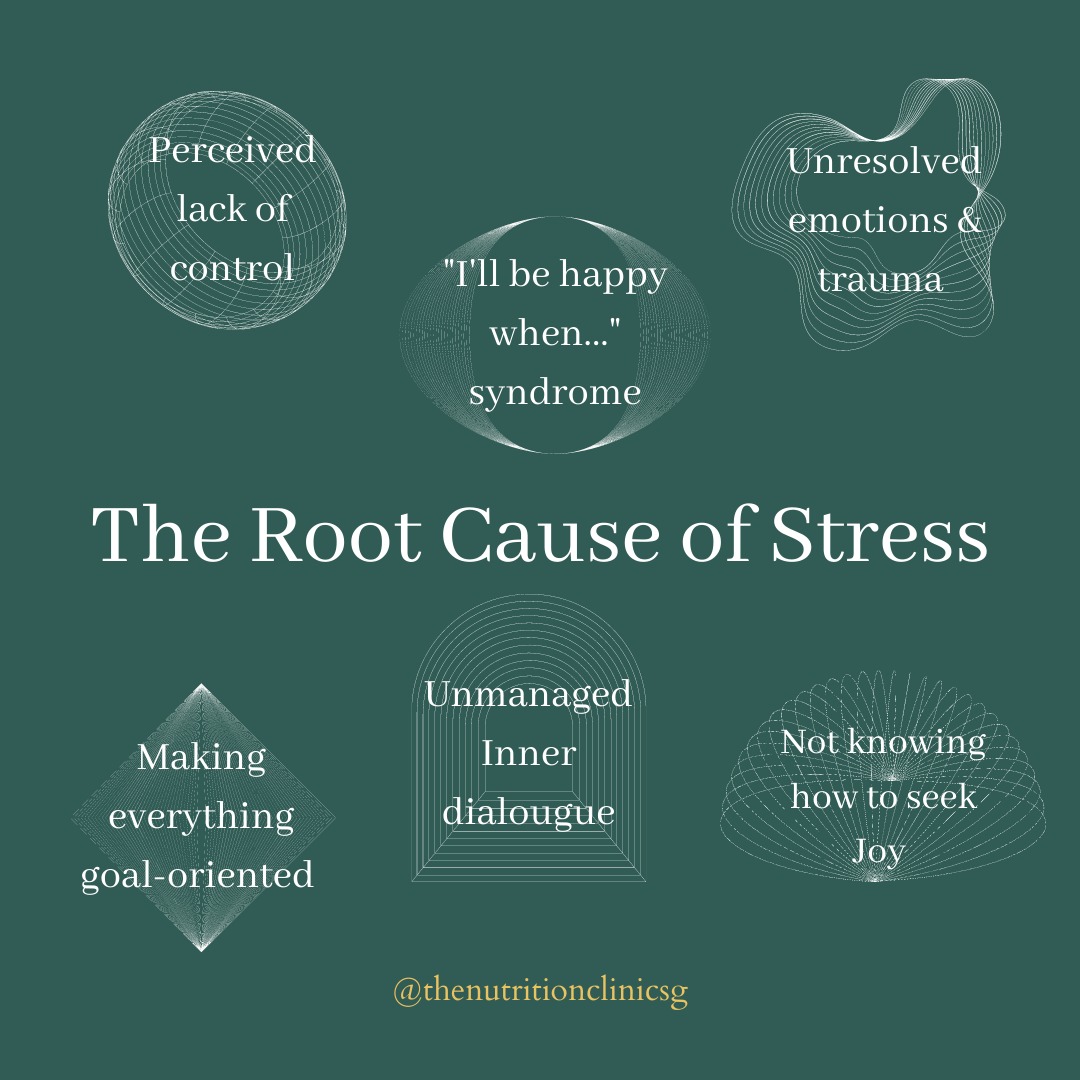The root cause of stress and stress eating

The power of managing your inner dialogues, how our brains are wired with a negative bias and the joy of just being.
More and more, we have young adults coming into the clinic and their test results indicating a high level of stress, edging close to total burnout.
Their adrenal cortex which produces hormones vital to life such as cortisol (helps regulate metabolism and the body’s stress response) and aldosterone (helps control blood pressure) are out of balance.
There are many categories of stress – emotional stress, dietary stress, pain in the body or hidden inflammation.
Stress can be an emotional, mental and/or physical reaction. Maybe it’s your job, your expectations that you have of yourself or even money problems that are stressing you out. While these are common triggers, they are rarely the root cause of stress.
Different people cope with prolonged stress differently. 18 months into Covid 19, it is normal for many of us to experience pandemic fatigue and sometimes a loss of control.

The key is to tune into your state of mind – is your inner dialogue being kind to you? Do you often find yourself in stressful situations? How do you react in these situations?
The emotional eater
People cope with the stress differently. Some resort to emotional eating, putting the body into a blood sugar roller-coaster, and creating a cycle of cravings, overeating and sometimes mood swings. Guilt often comes into the mix as well. They ping between clean eating, and sometimes even depriving themselves of food, before binging into comfort foods like ice-cream and greasy pizza, leaving them feeling stuck and defeated.

How to stop emotional eating and restoring your sense of self
First, we need to understand that stress triggers our body’s “fight or flight” response that releases a particular hormone into our blood stream that increases hunger – the body craves energy to combat against whatever stressor we may be facing.

Our mind and bodies have a natural intelligence of seeking and eating foods when we are hungry and stopping when we’re full. With emotional eating and binge eating, the compulsion to continue to eat even though the person is full is so great that it overrides the body’s signals telling them to stop.
Emotional eating or stress eating often not only lead to weight gain, but if not managed quickly, might manifest into deeper health and medical conditions including an eating disorder.
Keep a food diary and ask yourself these questions:
- Why am I craving this particular food?
- Is it really hunger or is it boredom? Why am I eating my feelings – is there a deeper reason to my boredom?
- Why do I feel the constant need to snack?
- What is one healthy eating habit I can start today?
- Why do I find it difficult to focus and be more mindful of what I eat?
- What else can I do to regulate my emotions without having to turn to food?
- What are the comfort foods do I crave the most? Make sure to keep temptations at bay by cleaning out your pantry.

Having a food diary helps you identify triggers that lead you to overeat as well as other unhealthy habits – research has shown that keeping a food diary has helped users create sustainable behaviour change. Remind yourself that comfort food only offers comfort for a short period of time and that if your feelings are not being addressed, it is easier to spiral into binge eating.

If you need more help, our Habits and Wellness Coach Bonnie can help you reset your habits and mindset around food, give you tips on how to clean out your pantry and make healthy swops suitable for your busy lifestyle. It all starts with one stackable tiny habit that creates a ripple of change.
Book a 10 minute consultation on how we can help.
You think everyone else is also really stressed, and that’s normal
At the clinic, we’ve observed that while some turn to food, in particular comfort food, to relieve stress, others deal with their emotions differently. And in many ways, emotional eating is a way one suppresses their feelings.
There are also some who are in constant state of prolonged stress that it becomes so normalised for them – they don’t realise that their nervous system is in a constant state of high alert.
Your body’s immune system responds to stress by releasing hormones like cortisol and adrenaline. Long term stress causes your adrenal glands to burn out from prolonged production of cortisol and this is where adrenal fatigue starts to set in.

Figure: Test results of a highly stressed and wired person – indicating Adrenal Fatigue in Phase 3 (out of 0-3)
Some cope with stress through exercise (sometimes by even over-exercising and pushing their bodies to the limit) to keep the edge off things. They keep a relatively healthy diet, eat a well balanced meal most times and have seemingly healthy habits. But something is just not right – their adrenals.
Before we can address adrenal fatigue, we need to know what exactly the true root causes of the stress may be.
And as we dig deeper, the root cause of stress is always feelings, thoughts, and the beliefs that one carries toward their life’s experiences.

Loss of control over our inner-dialogues
The power of your inner dialogue – the conversations we have with ourselves define us because the words we choose to think and speak to ourselves become our reality.
Having a negative inner dialogue diminishes our ability for true enjoyment. You can be relaxing at a beach somewhere and your mind can still talk you out from having a good time.
The core function of our inner dialogue is to make sense of both our inner and external worlds by analysing what is happening to and around us. But what happens when our inner dialogue ends up firing back to us and creating situations of emotional distress?

Our brains are wired to have a negative bias – we have an actual tendency to notice negative situations and events more easily than positive ones.
This neurological behaviour is inherited from our ancestors. It comes from a mentality for constant survival. A psychology for staying alive. According Daniel Kahneman, psychologist and 2002 Nobel Prize winner in Economics, the way we think has clear evolutionary value. They have our cognitive biases in the way we remember information, problem solve and make decisions. And subconsciously, we still carry this tendency in our nervous systems.
So, what can we do to start master our inner dialogues and prioritise our mental health?
1. Practice meditation and a sense of gratitude
We have anywhere between 60,000 to 80,000 thoughts every single day. Practising meditation every day and having the clarity of the mind helps override our negative biases and re-route the neural pathways to help cultivate a more positive and constructive inner dialogue.

While we can’t avoid all the negativity, we can turn away from it as often as we can. When we focus on the good, the good gets better.
2. Remember your true nature – life through the eyes of children
Children know how to seek joy. What seems so obvious to children, somehow, we have blocked off from seeking it for ourselves.

As adults, we squeeze joy out of our day to day because we are hyper focused on the things that needs to be done, our goals, and let a dozen other things continue to fill up our plate. Our constant pursuit for perfection and achievement is taking away from any sense of enjoyment.
Our hunger for success can sometimes blind us into caving into being looped into routines and circumstances that we find difficult to get out of – often at the expense of our own physical and mental health.
In Singapore and many Asian countries, many of us start off being expected to achieve academic excellence and move on to landing a great job that may or may not fulfil us. Then comes the next big goal. Life has become a strive for the next big thing.
We are constantly being told that in order to be successful, we have to constantly stay hungry for more.

And if everything we do is tied to a checklist or a goal, the things that you do are just things that you do – there is no joy to it.
Ask this to yourself – what do you do purely for fun?
At The Nutrition Clinic, we take into your health history, eating habits and lifestyle as well as your unique biology to craft your personalised health and wellness care with us.

Whether it’s stress eating and managing your food cravings, or alleviating your symptoms – our work aims to go further than that. We get to the root of the condition instead of just treating the symptom. We support you in your overall health and wellness goals and function optimisation.
Read more on first account experiences from our members.
Book a 10 min membership enquiry call here or drop us a message here.
Labels: Nutritionist Singapore, Burnout and Stress, Stress Eating, Functional Medicine Singapore

